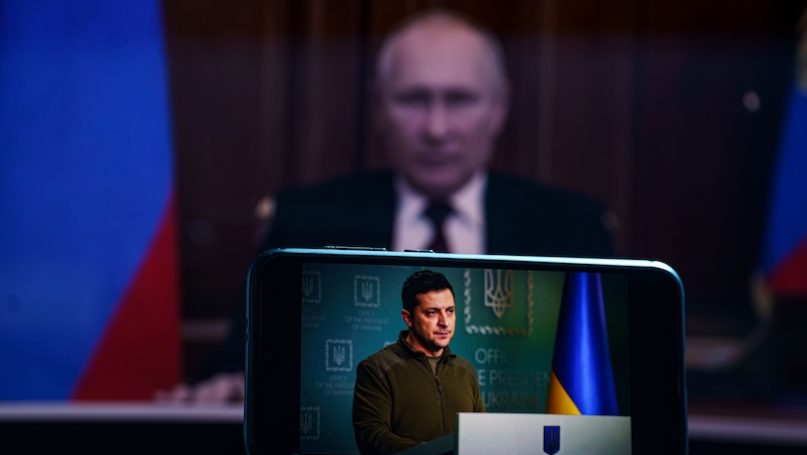
Russia’s invasion of Ukraine seems to have caught the political zeitgeist as a moral cause capable of reinvigorating failing political leaders, parties, and ideologies whether radical or conservative. Demonstrating support for the Ukraine appears to be practically mandatory in workplaces and public spaces the same way as wearing masks and socially distancing was during the earlier days of the pandemic. In the face of the moralising, widespread across the political spectrum, possibilities arise for critical approaches which start from a different political positionality.
Support for Ukraine appears to have helped political actors, international institutions and civil society groupings in their search for legitimacy and moral purpose. However, there is a certain hollowness to this ‘support’ which is more a matter of declaration than any willingness to go to war for the sake of the Ukraine let alone ease the path of EU accession. Supporting Ukraine involves little personal cost or commitment. People feel morally good about supporting Ukraine in a way that they would not about declaring any support for political parties or individuals.
In a world where people appear to be alienated from political parties and formal political projects, politics can easily become a matter of moral or ethical declaration rather than political engagement in building constituencies and relations. For this reason, political issues can easily become moralised; taken out of strategic relations and presented as existential questions. Carl Schmitt makes this point in Theory of the Partisan, in distinguishing telluric and non-telluric struggles. Non-telluric struggles, no longer grounded in a specific context, tend towards existentialist extremes, lacking a concrete audience and goals.
Western responses to the war highlight how moralisation has displaced practices of politicisation. The goal of politicisation is to clarify political stakes in the process of building a social and political movement of transformation. Moralisation is a poor substitute for this approach to community building as it abstracts individual political questions and issues from the contexts from which they derive. More importantly, moralisation leads to solipsism where what were previously political questions become statements of personal or group identity.
In the absence of political and organisational alternatives, reducing politics to demonstrating moral virtue leaves only limited room for political manoeuvre. The fact that doing ‘politics’ means expressing a ‘position’ has meant that those on the left have been forced into choosing between the rearmament of NATO powers and defending Putin’s regime, choosing between bad imperialists and even worse imperialists. For some this limit has been spun into a positive, for example with Spiked magazine giving full backing to NATO, bemoaning the ‘moral defeatism of the West’ and wondering ‘Is nothing worth a war?’
Our current context challenges the traditional understanding of political positionality. In the past a critical political response to international conflict may well have been oriented to the ‘enemy at home’, flagging up the double standards of Western moral and militarist claims (the ‘whataboutism’ discussed by Lorenzo Kamel). The political positionality of being a Western observer rather than a participant would have potentially restrained militarist demands to intervene because these calls for war could only empower ruling elites and institutions with extensive problematic records of their own.
Today, the framework which enabled this form of political positionality appears to have dissipated. This change is reflected in the fact that the moral consensus over the Ukraine is very different to the moralised political discourse of previous international conflict situations, where there was also the mobilisation of moral outrage, for example, the Balkans, Afghanistan and Iraq. The level of consensus is particularly striking considering that Western powers are (as yet) not directly involved. In fact, it is not so much even a political question of taking sides, more one of whether and how to demonstrate support.
Today, in the face of the moral displacement of politics it seems that a new understanding of political positionality may be necessary. One that recognises that traditional political frameworks no longer shape responses to events in the international sphere. From an anti- or ante- political positionality it seems clear that we should refuse the moral blackmail of taking sides and choosing a political position. It would be nice to pretend that we still lived in a modernist world of meaningful political choices, where ‘taking sides’ was part of a broader grand narrative of struggle and progress. However, we do not live in a world of left and right but in its moralised afterlife.
From a political positionality that recognises this shift, we should refuse the lure of the political and the moral pressure to declare our support for Ukraine. We should refuse the demand to moralise war and conflict. We should de-moralise the afterlife of politics and the world that enables it. Rather than exaggerating and bemoaning the ‘moral defeatism’ of the West we should rather be pushing it further. Is nothing worth a war? Perhaps as Aimé Césaire and Frantz Fanon recognised, the only war worth starting is one to end the world (and its political afterlife) rather than to salvage it.
Further Reading on E-International Relations
- Opinion – War in Ukraine: Why We Should Say No to International Civil Society
- Opinion – On and Beyond Whataboutism in the Russia-Ukraine War
- Opinion – A Hidden Victory? The Winter War and Russia’s Invasion of Ukraine
- Opinion – The Myth of Being Anti-Racist and Anti-War in the Ukraine Conflict
- Opinion – The War in Ukraine and Food Security in Africa
- Opinion – Strategic Perspectives on the Russia-Ukraine War